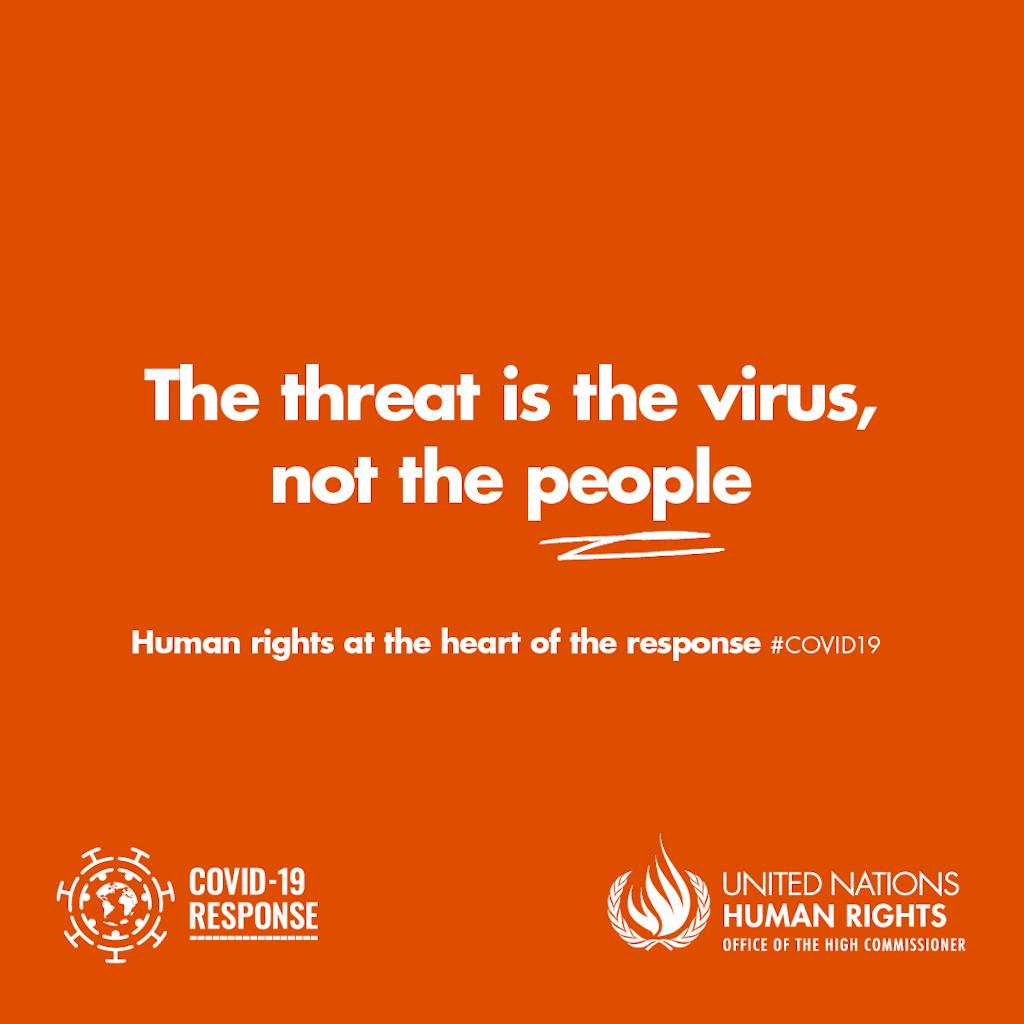As Coronavirus (COVID-19) has spread to all corners of the globe, governments have taken a range of actions to slow the spread including mandatory self-quarantining, limiting public gatherings, and closing non-essential businesses. UN officials, agencies, independent watchdogs, and the diplomatic community have made clear that for public health responses to be effective, they must protect human rights and dignity.
UN Secretary-General Antonio Guterres recently issued “COVID-19 and Human Rights: We are All in This Together” a call-to-action and compilation of best practices on the need to make human rights central to COVID-19 response and recovery. “This is not a time to neglect human rights; it is a time when, more than ever, human rights are needed to navigate this crisis in a way that will allow us, as soon as possible, to focus again on achieving equitable sustainable development and sustaining peace,” his report said.
#COVID19 is a public health emergency — that is fast becoming a human rights crisis.
People — and their rights — must be front and centre.
My new report on how human rights can and must guide #coronavirus response & recovery: https://t.co/CmYirKbsci pic.twitter.com/rssMV0MPBg
— António Guterres (@antonioguterres) April 23, 2020
Here are 6 reasons from the UN on why human rights should be the blueprint for responses to COVID-19:
1. A Global Response Starts with Leaving No One Behind
Human rights are universal, interdependent, and mutually reinforcing. From the UN’s perspective, so too must be the global response to COVID-19, both in national responses and across communities. According to the new UN report on human rights released by the Secretary-General, the right to life and duty to protect life; right to health and access to care; and freedom of movement are “frontline in the current pandemic.” “Embracing human rights as an integral part of our public health response will not only provide ethical guidance during these difficult times but set the foundation for how the world responds to public health crises going forward,” also notes a new WHO guidance note on human rights and COVID-19.
For example, the newly launched COVID-19 Solidarity Response Fund for the World Health Organization (WHO) is backing country-level efforts that, “Help vulnerable and at-risk countries, especially those with weak health systems, to step up their preparedness to prevent COVID-19, enhance their abilities to detect and test for the virus, and bolster their ability to respond to the spread.” (To learn more about the Fund or donate, click here).
Chairs of the ten UN human rights treaty bodies, the committees of experts charged with implementing international human rights treaties globally have also responded to the pandemic. A joint statement from the group declared “No one should be denied health care because of stigma, or because they belong to a group that might be marginalized.” Additionally, more than 60 UN special procedures mandate holders, including the UN Independent Expert on Sexual Orientation and Gender Identity, have said discrimination is unacceptable in applying life-saving measures in response to the virus. “Everyone has the right to health,” the group affirmed.
2. Discrimination and Xenophobia Are Unacceptable and Counterproductive
The UN has made clear that discrimination has no place in the response to COVID-19. The UN Secretary-General has warned, “it is shameful to see increasing acts of racial discrimination and prejudice as we fight the #COVID19 pandemic – a crisis that affects us all.”
The UN’s independent anti-racism watchdog, E. Tendayi Achiume, has also observed, “Political rhetoric and policy that stokes fear and diminish the equality of all people [responding to COVID-19] is counterproductive.” In short, societies are best able to respond with everyone working together.

The new UN report released by the Secretary-General encourages, “political leaders and other actors, including religious leaders, to speak out and take action against discrimination, hate speech, ageism, xenophobia, racism or violence arising from this pandemic, and promote inclusion and unity.” It also calls for ensuring that national and local recovery measures address the disproportionate impact of COVID-19 on migrants, displaced persons and refugees, people living in poverty, those without access to water and sanitation or adequate housing, persons with disabilities, women, older persons, LGBTI people, children, and people in detention or institutions.
3. Upholding Fundamental Freedoms Strengthens National Responses
Governments and cities across the world have taken extraordinary steps in response to the COVID-19. This includes actions requiring national populations to stay inside, travel bans, and restrictions on public gatherings.
A joint statement from more than a dozen UN independent human rights experts, including the UN Special Rapporteur on the Right to Freedom of Assembly, acknowledges that some emergency actions may be needed. However, the group recommends emergency actions enacted by decisionmakers “be narrowly tailored and should be the least intrusive means to protect public health [and] should not be used simply to quash dissent.” Adopting a rights-based response inclusive of policies protecting minority groups, say their experts, will help “facilitate the emergence of healthy societies with rule of law and human rights protections.”
David Kaye, the UN Special Rapporteur on the Freedom of Expression, has also warned against restrictions blocking the Internet as it is a critical source of information on the pandemic.
The new report released by the Secretary-General also notes that “people need agency and voice in a crisis [and] this is time when, more than ever, governments need to be open and transparent, responsive, and accountable to the people to the people they are seeking to protect.” It recommends that emergency measures must be officially proclaimed while being proportional, consistent with international law, time-bound, and non-discriminatory.
4. Solid Social Safety Nets are Key to Prevention and Building a Better World
The Secretary-General has also reminded the international community that, “we are only as strong as the weakest health system in our interconnected world.” As a result, robust and inclusive pubic institutions are a requirement to turn the tide on COVID-19.
For example, the UN Special Rapporteur on the Rights of Persons with Disabilities, Catalina Devandas, has recommended that national public campaigns and information bulletins be made available “to the public in sign language and accessible means, modes and formats, including accessible digital technology, captioning, relay services, text messages, easy-to-read and plain language.”
The UN Special Rapporteur on the Right to Adequate Housing has also noted that, “Housing has become the front-line defense against the coronavirus. Home has rarely been more of a life or death situation.”
Strengthening social-safety nets will also enable whole societies to build back better. “Strengthening economic and social rights bolsters resilience for the long haul,” says the new UN report on human rights and COVID-19. Examples of best practices in the report include the suspension of housing evictions; providing or extending sick to leave to workers; and providing child care for essential workers (among others).
5. A Gender-Lens Supports Empowerment and Data-Driven Responses
UN officials have made clear that it is crucial to consider the impact COVID-19 responses on specific populations, including women and girls. UN Women, for example, has issued a 10-point checklist for governments, municipalities, parliaments, and other decision makers to ensure women and girls are not left behind in responses to the pandemic.
The UN Population Fund (UNFPA) has also released a technical brief on COVID-19 responses and sexual and reproductive health and rights. UNFPA recommends the collection of accurate and complete age and sex-disaggregated data; the broadening of channels to report cases of gender-based violence that could result from practices such like social distancing; and ensuring that COVID-19 responses do not perpetuate problematic norms or inequalities.
The Secretary General’s report also calls for mitigating the pandemic’s impact on women through protecting sexual and reproductive health and rights, countering domestic and domestic gender-based violence, and ensuring fair and equal representation in COVID-19 recovery efforts.
6. The UN Human Rights Council Stands United on COVID-19
On April 9 the UN Human Rights Council launched an unprecedented virtual information meeting in response to COVID-19. During the web-session dozens of countries from every major world region, along with the High Commissioner for Human Rights, and civil society groups called for a human-rights approach to the crisis. The wide-ranging dialogue covered a wide spectrum of topics ranging from the urgency of protecting journalists to the consideration of humanitarian exceptions to certain economic sanctions.
“COVID-19 is about human rights, it’s affecting all human rights in their indivisibility and their interdependence. This is a moment where our beingness, it is about us as human beings . . . in how we interact with each other, affording dignity and respect. So, it’s fundamentally about human rights.” said South Africa’s delegation. “In this global crisis, the UN’s human rights voice needs to be loud and clear,” the Kingdom of the Netherlands’ delegation also said. The UN Human Rights Council is expected to meet virtually again on the pandemic on April 30.
Adopting a human right-based approach is not only the right thing to do, it is critical for the success of the global COVID-19 response. According to UN High Commissioner for Human Rights Michelle Bachelet, “COVID-19 is a test for our societies [and] human dignity and rights need to be front and center in that effort, not an afterthought.”
This blog was co-authored by Grace Anderson, Ryan Kaminski, and Cameron Kaufmann.
donate today
Every donation makes a difference. Support WHO’s life-saving efforts to respond to the COVID-19 pandemic by giving to the COVID-19 Solidarity Response Fund. Donations made via Facebook will be matched up to $10,000,000. Through June 30, 2020, for every $1 you donate here, Google.org will donate $2, up to $5,000,000.




 View All Blog Posts
View All Blog Posts




